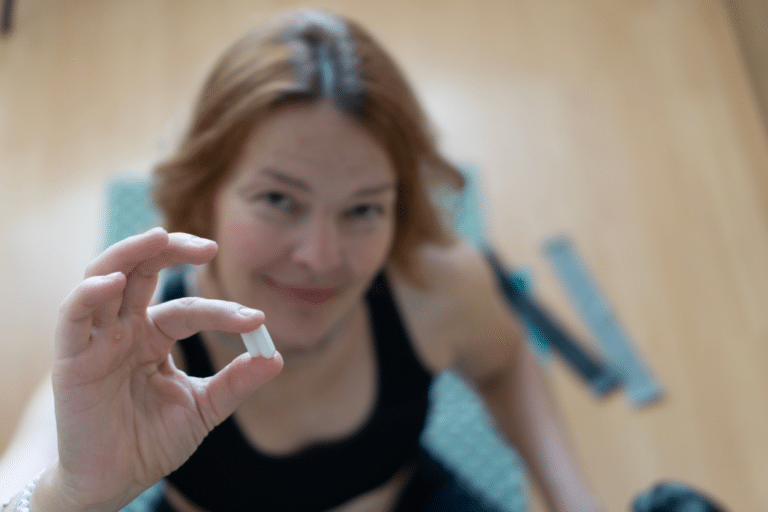Aging is not a disease, but it is the single biggest risk factor for most chronic illnesses, from heart disease to dementia. Scientists are now looking at ways to target the process of aging rather than waiting for disease to appear. Here’s what we know so far about several of the most promising medications and supplements under study.
If you missed my recent post about mitochondria and the importance of optimizing cellular energy, start here.
Metformin
Metformin is a well-known diabetes medication that’s showing potential for longevity. It activates a pathway called AMPK, which improves energy balance, reduces inflammation, and supports mitochondrial function. Think of it as putting your cells into metabolic clean-up mode.
Observational studies suggest that diabetics taking metformin live longer than those on other medications. The TAME trial (Targeting Aging with Metformin) is currently underway to test whether it can delay age-related diseases in healthy older adults. Results are still years away, but it’s one of the most anticipated longevity studies in progress.
Rapamycin
Rapamycin works by inhibiting mTOR, a cellular pathway that regulates growth and metabolism. When mTOR activity is too high, cells don’t clean up damaged components efficiently. Rapamycin slows this process, allowing better cellular maintenance and reduced oxidative stress.
In mice and other organisms, rapamycin consistently extends lifespan. However, it’s a potent drug that suppresses the immune system, so researchers are cautious about using it preventively in humans. Lower-dose or intermittent dosing strategies are being explored to see if we can harness the benefits without the risks.
Resveratrol
Found in red grapes and berries, resveratrol has long been marketed as the secret behind the “French Paradox.” It activates sirtuins, proteins linked with cellular repair and longevity.
While it’s promising in lab studies, results in humans have been mixed. Most experts agree that the doses needed for measurable benefits are much higher than you could ever get from a glass of wine. It’s not useless, but it’s not the magic youth serum some headlines suggest.
Taurine
Taurine is an amino acid that supports mitochondrial health, antioxidant defense, and DNA repair. In animal studies, taurine supplementation increased healthy lifespan and reduced inflammation.
Human data is limited, but one study found that taurine levels decline with age and that supplementing may improve markers of health. More trials are needed before it’s ready for mainstream use as a longevity supplement.

Want to create a custom longevity health plan?
You’re in the right place.
I can help you with a functional approach to midlife women’s health including hormone balance, gut health, autoimmune issues, bone health, heart health and more!
Vitamin D
Vitamin D influences hundreds of genes involved in immune function, muscle strength, and brain health. Low levels are associated with faster aging markers such as shorter telomeres and increased inflammation.
Ensuring adequate vitamin D is foundational for health, and studies suggest it may slow biological aging. While megadoses aren’t recommended, optimizing vitamin D through sunlight, food, or supplementation supports long-term vitality. I recommend keeping levels between 50-80 ng/mL and combining it with Vitamin K2 for an extra bone health boost.
NAD+ and Its Precursors (NMN and NR)
NAD+ is a molecule found in every cell. It is essential for energy production, DNA repair, and gene regulation. Levels decline with age, which is associated with fatigue, metabolic slowdown, and cognitive decline.
Supplements such as NMN (nicotinamide mononucleotide) and NR (nicotinamide riboside) aim to boost NAD+ levels. Animal studies show impressive results, including improved mitochondrial function, better insulin sensitivity, and enhanced endurance.
In humans, early trials are encouraging but modest. NAD+ precursors appear safe and increase NAD+ levels, but whether this translates to longer life or better healthspan remains to be proven.
Spermidine
Spermidine is a natural compound found in foods like wheat germ, soybeans, mushrooms, and aged cheese. It promotes a process called autophagy, your body’s way of cleaning out damaged cells and proteins.
Autophagy declines with age, leading to cellular “junk accumulation.” By stimulating this clean-up process, spermidine may support longevity.
Several observational studies have linked higher dietary spermidine intake to lower mortality rates, and early human trials suggest it may improve heart health and cognitive function. Spermidine supplements are already popular in Europe, though long-term data is limited.
Urolithin A
Urolithin A is a metabolite produced when gut bacteria break down compounds in pomegranates and certain berries. It enhances mitochondrial function, a key aspect of cellular energy and longevity.
Clinical trials have shown that urolithin A improves muscle strength and endurance in older adults, making it one of the more promising longevity compounds for real-world benefits. It’s now available as a supplement, though not everyone produces it efficiently from diet alone.
Its mechanism, known as mitophagy, helps clear out damaged mitochondria and encourages the growth of new, efficient ones. That’s crucial for maintaining energy and vitality with age.
What Does All This Mean?
There’s real excitement in longevity research, but there’s also a lot we still don’t know. While animal data is often compelling, translating those findings to humans takes years. Many of these compounds, especially the pharmaceuticals, should only be used under medical supervision.
Here’s the truth: none of these are magic bullets. They may help support the biological systems that slow aging, but the foundations still matter most. Nutrition, strength training, restorative sleep, stress management, and meaningful connection are the levers that turn theory into transformation.
If you’re curious about how to integrate safe, evidence-based longevity tools into your own health plan, let’s talk. You can learn more or schedule a consultation at www.drannagarrett.com/lets-talk. You can also check out my mitochondrial support protocol here.
I’ll be focusing in on some of these compounds in future blog posts!
References
- Mohammed, I., Hollenberg, A., Ding, J., & Triggle, C. R. (2021). A critical review of the evidence that metformin is a putative anti-aging drug that enhances healthspan and extends lifespan. Frontiers in Endocrinology, 12, 718942.
- Soukas, A. A., et al. (2019). Metformin as anti-aging therapy: Is it for everyone? Trends in Endocrinology & Metabolism, 30(10), 745–757.
- Johnson, S. C., Rabinovitch, P. S., & Kaeberlein, M. (2013). mTOR is a key modulator of ageing and age-related disease. Nature, 493(7432), 338–345.
- Baur, J. A., & Sinclair, D. A. (2006). Therapeutic potential of resveratrol: the in vivo evidence. Nature Reviews Drug Discovery, 5(6), 493–506.
- Schaffer, S. W., et al. (2018). Taurine and the aging process. Advances in Experimental Medicine and Biology, 975, 19–27.
- Zhang, W., et al. (2024). Vitamin D, omega-3, and exercise effects on biological aging: a randomized clinical trial. Nature Aging.
- Trammell, S. A., & Brenner, C. (2013). Nicotinamide riboside is a major NAD+ precursor vitamin in mammals. Science, 342(6163), 372–375.
- Yoshino, J., et al. (2021). Nicotinamide mononucleotide increases muscle insulin sensitivity in prediabetic women. Science, 372(6547), 1224–1229.
- Eisenberg, T., et al. (2016). Cardioprotection and lifespan extension by the natural polyamine spermidine. Nature Medicine, 22(12), 1428–1438.
- Madeo, F., Eisenberg, T., Pietrocola, F., & Kroemer, G. (2018). Spermidine in health and disease. Science, 359(6374), eaan2788.
- Ryu, D., et al. (2016). Urolithin A induces mitophagy and prolongs lifespan in C. elegans and increases muscle function in rodents. Nature Medicine, 22(8), 879–888.
- Andreux, P. A., et al. (2019). The mitophagy activator urolithin A is safe and induces a molecular signature of improved mitochondrial and cellular health in humans. Nature Metabolism, 1(6), 595–603.
Dr. Anna Garrett is a menopause expert and Doctor of Pharmacy. She helps women who are struggling with symptoms of perimenopause and menopause find natural hormone balancing solutions so they can rock their mojo through midlife and beyond. Dr. Anna is the author of Perimenopause: The Savvy Sister’s Guide to Hormone Harmony. Order your copy at www.perimenopausebook.com.
Dr. Anna is available for 1-1 consultations. Find out more at www.drannagarrett.com/lets-




